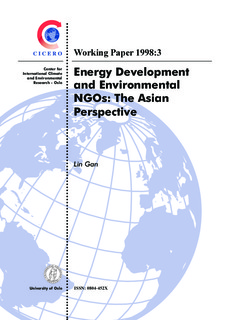| dc.description.abstract | In summary, Asian NGOs play an important role in international and national energy and environmental activities. Their increasing presence in the world political arena has helped, in one way or another, reshape agendas of governments and international aid agencies. They have also facilitated the establishment of critical links between local communities and institutions of governments and aid agencies. They have come to define new areas of interest and develop catalysts for action. Governments and aid agencies have benefited from interactions with the NGO community, but have also been puzzled about how to deal with them in proper and cost-effective ways. What we see in this interrelationship is a complex and dynamic process.
NGO movements on energy and the environment cannot be considered in isolation. They are conducted in a dynamic, rather than static, process. They change their perspectives, according to international and local circumstances. Their engagement in sustainable energy and environment activities has helped establish new and critical links among societal institutions. They base their strategy for survival on linking local and global perspectives. NGOs have managed to create a niche within societal contexts, establishing themselves as both a social critique and a service provider, in order to deal with governments and international aid agencies. Over the past one and a half decades, NGOs in Asia have learned how to cope with changes in international environmental arenas. Their establishment in world politics, through participation in sustainable energy and environmental activities, reflects a trend of transition in international relations that will profoundly impact human society in the 21st century.
NGO movements as a particular social phenomenon can be characterized as having been developed from below. NGOs have managed to establish themselves as social agents with critical linkages to those at the bottom in society. They have developed a public space that is not, and cannot be, filled by other societal institutions: governments, international aid agencies, and the private sector. NGO movements are deeply rooted in societal contexts. NGO activities reflect the needs of those from the lowest levels of the human society. This is in contrast to many institutions generated by governments from above. The development and growth of NGOs as a social entity has proved to be crucial to the wellbeing of human society. The influence of NGOs across national boundaries can be seen as part of the globalization process. It will have far-reaching effects on public policy and sustainable energy development in Asia.
NGOs represent the future engine of world development. The conflict between energy development and the environment is far from over. The internal logic of NGOs’ development is self-evident. From the Asian perspective, several characteristics can be generalized from the current development: first, NGOs will continue to create new social linkages, or webs of contacts, throughout human society. They will help establish and improve relationships between the general public and other social institutions: governments, international agencies, and the business community. Second, the diversification and outgrowth of NGOs will continue to increase with greater speed and scope. This will be especially seen in energy and environmental fields, because of the imperative of environmental deterioration and its impact on human prospects for survival.
One important question that needs further analysis is how to improve the accountability of NGOs with regard to their performance in projects. We need to develop workable methodologies and criteria for evaluating NGO performance. This is critical in getting NGOs involved more in sustainable energy and environmental activities. The increasing involvement of NGOs in environmental activities provides good opportunities for the UN and the international development assistance community. Through increasing engagement of NGOs in design, consultation, operation and evaluation of projects, these institutions will be able to act as agents to empower the people in the lower levels of human society. With more incentives to support the NGO sector, greater social equilibrium could be achieved. It can be assumed that NGOs might assume many of the conventional mandates that are usually performed by specialized UN agencies and governments. What represents the so-called global civil society is the inclusion of people’s voices and needs. NGOs have come into being through this social process. | nb_NO |
